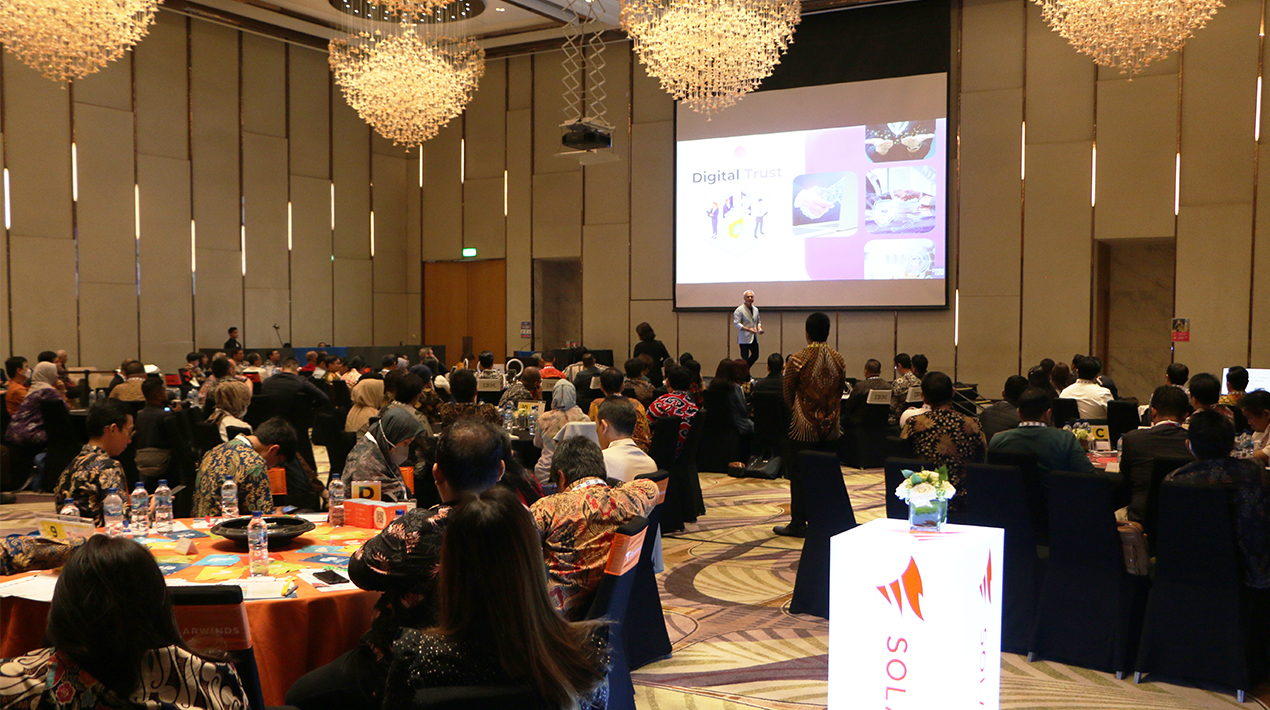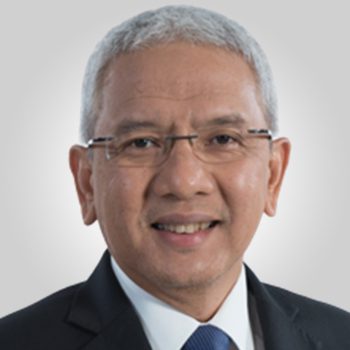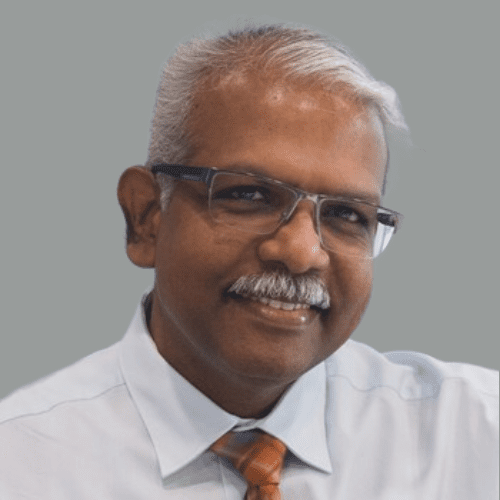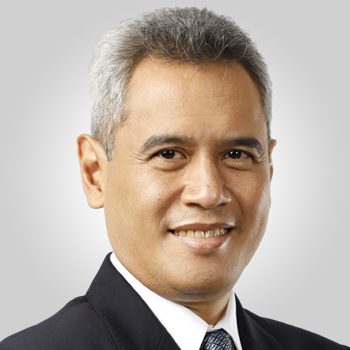
|
Getting your Trinity Audio player ready...
|
Indonesia, a dynamic archipelago in Southeast Asia, is pursuing the ambitious “Indonesia Emas 2045” vision, aiming to become one of the world’s leading economies by 2045. Embracing digitalisation is recognised as a crucial step towards achieving inclusive development and fostering sustained economic growth. The vision outlines transformative goals for the economy, innovation, infrastructure, and the workforce, acting as a roadmap for Indonesia’s future progress.
A robust digital ecosystem offers citizens access to various services and resources, elevating their overall quality of life. Digital transformation plays a pivotal role in achieving Indonesia’s objectives, empowering the nation to move rapidly towards its desired goals by embracing innovative solutions and addressing key challenges.
Incorporating a strong digital environment benefits businesses and their employees by automating processes, enhancing communication, and promoting collaboration, leading to increased productivity and efficiency. The ongoing evolution of the digital economy creates new job opportunities and fosters investment, bolstering Indonesia’s global competitiveness.
Embracing digital transformation enables Indonesia to enhance productivity, stimulate innovation, and optimise operations, propelling the nation closer to its development objectives. By leveraging cutting-edge technologies and data-driven insights, Indonesia can attract foreign investment and drive economic growth.
The success of digital transformation requires a comprehensive strategy. As Indonesia continues to harness the potential of digital technologies, it can remain competitive and adaptive in a rapidly changing global landscape, paving the way for a prosperous and sustainable future.
The Indonesia OpenGov Leadership Forum 2023, held at The Westin Jakarta on 03 August 2023, brought together technology leaders from various sectors, including government, education, healthcare, government-linked companies (GLC) and financial services institutions (FSI), empowering them with insights into new technologies and strategic approaches to drive positive changes in their organisations.
Opening Remarks

Mohit Sagar, the CEO and Editor-in-Chief of OpenGov Asia, recognises that technology encompasses a diverse array of tools, technologies, and approaches aimed at empowering humans to address challenges and enhance their lives significantly, streamlining various aspects and making daily tasks more convenient and efficient.
“Technology is indispensable and cannot be overlooked; it plays a pivotal role in nearly every aspect of our lives,” Mohit knows full well. “In today’s world, technology has become inextricably intertwined with our daily existence.”
The pandemic has served as a stark reminder for all about the paramount importance of digital technology, particularly for organisations. Through the adoption of appropriate digital solutions, companies can maintain productivity even amidst challenging circumstances.
Moreover, the integration of digital technology enables organisations to achieve substantial cost savings as tasks are carried out with greater efficiency and effectiveness. Embracing digital advancements has proven to be a crucial factor in enabling businesses to thrive in today’s dynamic environment.
Similar to numerous other countries, Indonesia is actively pursuing digital transformation across various aspects of everyday life. The nation envisions a future marked by robust economic expansion, aiming to establish itself as a prominent global player by the year 2045.
Embracing digital technologies is a pivotal part of this strategy, as it enables Indonesia to enhance its competitiveness, foster innovation, and drive inclusive growth across sectors. By leveraging digital transformation initiatives, Indonesia is striving to create a progressive and prosperous future for its citizens while solidifying its position on the global stage.
Mohit understands that the country’s vision revolves around a holistic approach to nurturing economic development, fostering innovation, and enhancing global competitiveness. At the core of this strategy lies the establishment of a resilient digital infrastructure and widespread connectivity.
By investing in and bolstering these digital foundations, the nation aims to unleash its full potential, enabling businesses, individuals, and institutions to thrive in an interconnected world. This commitment to embracing digital transformation paves the way for Indonesia’s bright future, poised to flourish as a leading player in the global landscape.
According to Mohit, Indonesia is actively investing in expanding its broadband network and enhancing internet accessibility with a particular focus on narrowing the digital divide, especially in rural and remote regions. By undertaking these initiatives, the country aims to establish a robust digital foundation that fosters an environment conducive to the growth of the digital economy.
The overarching goal is to ensure that every citizen can benefit from the abundant opportunities presented by the digital age. Through these concerted efforts, Indonesia seeks to create a more inclusive and equitable society, where the advantages of digital technology are accessible to all, regardless of their geographical location or socioeconomic status.
Mohit’s perspective on the relationship between generative AI and robotics is optimistic and forward-thinking. He thinks that these technologies should be seen as allies rather than adversaries. Despite some concerns raised by certain individuals about the potential threats of technology, he chooses to believe that the positive aspects outweigh any apprehensions.
According to him, generative AI and robotics can be valuable partners for humans, playing a crucial role in enhancing various processes and improving overall performance efficiently. Indeed, the developments in these two fields have made significant contributions to enhancing efficiency, productivity, and convenience across various sectors, such as industry, health, transportation, and more.
Generative AI, in particular, has opened up exciting opportunities in art and creativity, revolutionising how people express themselves and creating new forms of artistic expression. On the other hand, robotics has proven to be a valuable asset in tackling demanding and high-stakes tasks, where precision, strength, and endurance are essential.
Mohit’s belief in achieving sustainable success through digital technology implementation is centred around the 6P framework:
People: Recognising the significance of human resources and talent in driving digital transformation.
Product: Ensuring a focus on developing and adopting cutting-edge digital products and solutions that align with the objectives and serve customers or users.
Process: Streamlining and optimising existing processes to integrate digital technologies seamlessly, enhancing organisational efficiency and agility.
Prioritisation: Identifying and ordering the most critical digital initiatives that align with the strategic goals, ensuring the best allocation of resources.
Perseverance: Emphasising the importance of persistence and resilience in the face of challenges and setbacks that may arise during the digital transformation journey.
Partnerships: Acknowledging the value of collaboration and strategic partnerships to leverage expertise, share knowledge and access resources that can accelerate digital transformation efforts.
Instead of fearing these advancements, Mohit advocates embracing them responsibly to unlock their potential to create a better future. By leveraging these technologies in harmony with human capabilities, he envisions a world where innovation and collaboration lead to greater productivity, improved problem-solving, and enriched lives for all.
“In the end, we have to accept that cutting-edge technologies like robotics and generative AI are enablers and catalysts,” he concludes. “Technological progress must be perceived as a means to empower humanity towards a sustainable future.”
Keynote Address

Dr Ir Rudy Salahuddin, MEM, Deputy Minister for Digital Economy, Manpower, and SMEs, Coordinating Ministry for Economic Affairs of the Republic of Indonesia, emphasises that expediting digital transformation is crucial in achieving Indonesia’s ambitious economic transformation goal of “Indonesia Emas 2045”.
The ASEAN region has experienced significant growth in the digital economy, with Indonesia playing a vital role by contributing 40% of ASEAN’s digital economy market spending. The country’s digital economy value is expected to reach USD 360 billion by 2030, supported by a thriving start-up ecosystem and favourable investment trends.
By harnessing the power of technology and digital innovation, Indonesia has the potential to foster sustainable progress, enhance competitiveness, and secure the prosperity of its nearly 270 million citizens, making it the fourth most populous country in the world.
Despite Indonesia’s vast population, not everyone in the nation has equal access to digital services. The availability of high-speed internet connectivity remains limited in certain areas, while data centres are insufficiently distributed in other regions. This digital divide poses a challenge to ensuring equitable access to technology and its benefits for all citizens.
“The absence of digital infrastructure is a significant obstacle to social inclusion and economic growth,” Dr Ir Rudy Salahuddin observes.
To achieve universal access to digital services across Indonesia, it is essential to prioritise investments in reliable digital infrastructure. This entails building and expanding data centres, enhancing digital platforms, and improving high-speed internet connectivity. Such investments are crucial for enabling businesses to operate online effectively and ensuring that citizens can access essential government, healthcare, and educational resources that are increasingly reliant on digital technologies.
Dr Ir Rudy Salahuddin underscores the importance of data centres to store and analyse massive volumes of data, which are essential for numerous enterprises and government organisations. Additionally, digital platforms play a crucial role in facilitating connectivity among people and providing access to online information and services.
“To realise its domestic and global ambitions, the government of Indonesia knows that investing in infrastructure is vital,” he says.
Dr Ir Rudy Salahuddin acknowledges that investing in a robust digital system may require time, but it promises significant long-term benefits. By allocating funds to digital infrastructure, Indonesia can create a wealthier and more inclusive society, fostering opportunities for everyone.
Initiated in 2019, the “Making Indonesia 4.0” programme was created to position Indonesia as a digital leader in Southeast Asia. The programme includes several projects to improve digital infrastructure, such as building a national fibre optic backbone and making a cloud computer platform.
Indonesia has evolved into a vibrant hub for digital businesses, driven by an increasing number of tech-savvy individuals and a rapidly expanding digital economy. To sustain this progress and unleash the country’s full entrepreneurial potential, creating a thriving environment that fosters innovation and equips aspiring entrepreneurs with the necessary tools for success is of utmost importance.
“The focus has to be on promoting startup incubators, giving access to funds and encouraging innovation hubs all over the country,” Dr Ir Rudy Salahuddin explains. “This will show how robust and conducive the ecosystem and entrepreneurial environment is.”
Startup centres play a crucial role in facilitating the establishment of new businesses by providing entrepreneurs with essential support, tools, and networking opportunities to refine their ideas and transform them into market-ready products. Additionally, these incubators create a supportive environment that encourages risk-taking and experimentation, fostering a culture of innovation, which is vital for driving entrepreneurial success.
Access to financial resources remains a significant challenge for many entrepreneurs, hindering their growth and expansion prospects. To address this gap, government programmes and partnerships with the business sector can play a pivotal role by encouraging investments in startups.
Initiatives like venture capital funds, investor networks, and crowdfunding platforms can help overcome financial barriers, enabling startups with promising ideas to secure the necessary funding for their growth and development.
Moreover, innovative spaces foster collaboration and knowledge-sharing among individuals. By bringing together diverse talents from various fields, these hubs ignite creativity and encourage interdisciplinary problem-solving. Creating physical and virtual spaces that facilitate interactions between entrepreneurs, researchers, and industry experts cultivates an environment where groundbreaking ideas are more likely to flourish.
“The country is quickly turning into a digital economy, and the need for people who know how to use technology is growing. To meet this demand, the government of Indonesia needs to train and retrain its workers,” Dr Ir Rudy Salahuddin believes.
Promoting digital literacy can be achieved through various methods. First, providing education on basic technology usage is essential, ensuring people have the necessary skills to navigate modern technologies.
Secondly, offering coding education empowers individuals to create software and other digital products, fostering digital innovation.
Finally, government-led programmes that focus on teaching specific digital skills, such as website development or data analysis, can further enhance the digital capabilities of the population, enabling them to thrive in the digital era.
Teaching people how to use technology is crucial to ensure their participation in the digital economy. Coding education is essential to develop a skilled workforce capable of creating software and digital products, which are vital for the economy’s growth. Additionally, vocational training programmes play a vital role in equipping individuals with the necessary skills to secure jobs in the expanding digital economy, fostering economic development and inclusivity.
The government can facilitate skill development by providing funds for education and training programmes, making it accessible for people to participate in these initiatives. Collaborating with companies to establish internship and apprenticeship programmes can also offer valuable experience in the digital economy.
By taking these steps, the government can help make sure that Indonesian workers have the skills they need to do well in the digital age. This will help Indonesia’s economy grow and create jobs, and it will also make the country more competitive in the digital economy.
Dr Rudy highlighted the following specific ways the government can upskill and reskill the workforce in Indonesia:
- Partner with universities and colleges to offer digital literacy and coding courses
- Create online learning platforms that offer digital skills training
- Provide financial assistance to people who want to upskill or reskill
- Work with businesses to create demand for digital skill
- Promote the benefits of upskilling and reskilling to employers and employees
“The country is quickly turning into a digital economy, and people must be able to understand and use technology if they are to both benefit from and participate in it,” Dr Ir Rudy Salahuddin furthers. To meet this demand, the government of Indonesia needs to train and retrain its workers. Fostering a highly skilled and adaptable workforce ready for the digital age will ultimately ensure Indonesia’s competitiveness in the global economy.
Dr Ir Rudy Salahuddin believes with a strategic approach and multi-sectoral cooperation, digital transformation can propel the nation towards achieving its vision of Indonesia Emas 2045.
“Indonesia’s commitment to digital transformation positions it as a leading force in the region and a beacon of digital innovation for the world,” Dr Ir Rudy Salahuddin concludes. “The country is poised to make significant progress, supported by technology-driven growth and the concerted efforts of various stakeholders.”
Technology Case Study

According to Kieran Hagan, Principal Technical Sales Leader for Data, AI, and Automation at IBM ASEANZK, the current state of Artificial Intelligence (AI) is highly promising due to a significant development – “Generative AI”.
This recent advancement has opened up new possibilities in the field of AI. The ability of “Generative AI” to interact with data holds immense potential for positively impacting various aspects of both daily life and business operations.
“Generative AI” is a form of artificial intelligence that exhibits the ability to autonomously generate novel text, information, or visuals by leveraging patterns and knowledge obtained from previous data. This remarkable capability positions generative AI as a potent tool in diverse domains such as design, creativity, data modelling, and the arts.
Its capacity to create new content independently opens up exciting possibilities for innovation and enhancement in these fields. For instance, Generative AI has been applied to the art sector to produce creative, one-of-a-kind works of art that include novel aspects and explore boundless creativity.
“By utilising the knowledge gained from prior data, Generative AI has contributed to the development of imaginative and effective product creations in the design space,” Kieran observes.
AI’s increasing prevalence is evident in various aspects of daily life, particularly in the corporate world. Its rapid and intelligent capabilities have revolutionised work processes and business operations. Its ability to analyse data, identify trends, and provide valuable insights has been a key driver in enabling more efficient and informed decision-making within organisations.
During this era of rapid technological advancement, IBM, a leading technology firm, has played a vital role in guiding individuals and organisations to embrace AI responsibly and sustainably. Through its initiatives and expertise, IBM has been instrumental in helping society navigate the challenges and opportunities presented by AI adoption.
According to Kieran, making wise business decisions is crucial for gaining a competitive edge in the data and AI era. To support businesses in this endeavour, IBM provides a range of advanced and trustworthy AI solutions. These solutions enable organisations to optimise their operations, increase productivity, and deliver improved customer service.
Kieran stresses the paramount importance of cybersecurity for both countries and organisations in today’s interconnected world. With vital infrastructure and data residing in complex hybrid cloud environments, security challenges have become increasingly intricate and diverse.
In response to these evolving threats, both the public and private sectors must adopt a comprehensive and proactive approach to ensure the safety and protection of their invaluable assets. By prioritising cybersecurity, they can fortify their defences, mitigate risks, and safeguard their critical resources from potential cyberattacks and breaches.
“First and foremost, it is crucial to guarantee the safety and protection of the public,” Kieran believes. “The state is accountable for protecting residents’ sensitive information and personal data to provide a secure environment for all citizens.”
To mitigate potential cyber threats, including unauthorised access to personal information, it is imperative to establish a robust and up-to-date cybersecurity system. Creating a strong defence against cyber risks involves enhancing awareness of digital hazards and promoting education about best practices in digital security.
By empowering individuals with knowledge and understanding of cybersecurity, they can actively participate in protecting themselves and others from cyber threats, contributing to a safer and more secure digital environment for everyone.
The safety of a nation’s vital infrastructure is closely linked to its national resilience. Critical infrastructure, such as telecommunication, transport, and electrical networks, is highly vulnerable to cyber-attacks in the era of advancing information technology.
Kieran says the critical importance of safeguarding infrastructure to protect the nation from potentially devastating consequences cannot be overstated. To effectively address the evolving nature of cyber threats, governments must make significant investments in cybersecurity and develop robust defence strategies.
Additionally, data communication plays a crucial role in complex hybrid cloud systems, enabling innovation and enhancing organisational capabilities. However, such collaboration also brings about substantial security and confidentiality challenges. Balancing the benefits of data exchange with the need for stringent security measures becomes paramount to ensure the safe and productive functioning of hybrid cloud environments.
“Therefore, organisations must adopt a responsible strategy to mitigate these risks,” Kieran advises. “Implementing measures like data encryption, prudent data access management, and stringent access restrictions are essential to maintaining high standards of security and privacy.”
Moreover, collaborating closely with cloud service providers and other stakeholders is vital to ensure comprehensive protection and effectively address potential vulnerabilities in hybrid cloud systems. By fostering a strong partnership, organisations can benefit from the expertise and specialised security measures offered by cloud service providers, enhancing the overall security posture of their hybrid cloud environments.
In the end, commitment to ethical practices and responsible AI implementation will be instrumental in cultivating a more reliable and advantageous AI ecosystem for all stakeholders. By leveraging AI’s capabilities efficiently, businesses can unlock new possibilities, overcome intricate obstacles, and make well-informed decisions, driving them towards success in a dynamic and ever-changing technological landscape.
“With a focus on responsible AI adoption and continuous innovation, IBM paves the way for a future where AI not only empowers organisations but also enriches the lives of individuals worldwide,” Kieran concludes.
Technology Case Study

According to Raymond Goh, Vice President of Sales Engineering, APJ at Veeam, in the current data-driven landscape, we anticipate data availability and resilience to reach unprecedented levels. There is a growing expectation for data to evolve into a more intelligent state, capable of automatically predicting threats and meeting demands seamlessly.
“Intelligent data management speeds up innovation and the delivery of new digital services and experiences that enhance how we live and work by bringing fresh insights from data and quick boosts in productivity,” he says.
Ensuring the secure transfer of data between multi-cloud infrastructures is paramount. Additionally, data must meet the requirements of the mobile and always-on environment to maintain its relevance and accessibility.
Veeam identifies five crucial stages that constitute the path to Intelligent Data Management: Protection, Mobility, Observability, Orchestration, and Automation. These stages play a pivotal role in achieving a comprehensive and intelligent approach to managing data effectively.
Raymond emphasised the significance of protection in ensuring that all workloads remain consistently recoverable and accessible, even in the face of outages, cyber threats, unintentional loss, or theft. This involves securing all workloads through backups and, where appropriate, leveraging snapshots and replication to enhance data resiliency.
With the aid of mobility, rapid recovery from both on-premises and cloud-based workloads is facilitated, enabling seamless migration across hybrid cloud environments. By embracing mobility, businesses can uphold continuous operations and ensure high availability, thus safeguarding their critical data and services.
Observability plays a crucial role in shifting from reactive to proactive data management and enhancing business decision-making. By offering a comprehensive view of the entire data landscape, including the underlying infrastructure it traverses and resides on, observability empowers organisations to gain valuable insights.
This proactive approach aids in detecting potential cyber threats early on, enabling preemptive measures to safeguard against security breaches. Additionally, observability allows businesses to optimise their operations and identify areas for improvement, thereby driving efficiency and innovation.
Using workflows that guarantee the consistent execution of otherwise manual and difficult backup, recovery, and data management processes, orchestration can optimise data utilisation across multi-cloud systems. Besides, automation transforms data into self-managing information that is aware of cyber threats and learns how to secure itself to meet business needs or adhere to larger IT goals.
Raymond reveals that the Data Domain Group places a strong focus on data governance, architecture, protection, sharing, and storage. Through these initiatives, the group aims to ensure that organisations implement efficient data management procedures that effectively utilise and safeguard data throughout its entire lifecycle.
Raymond explains that these domains are structured into the following categories: Data Classification, Data Protection, Data Acquisition, Data Processing and Fusion, and Data Access and Distribution. Each domain outlines specific requirements for data access, distribution, and utilisation, which are essential for effective data-sharing practices. By following these guidelines, organisations can ensure proper handling and use of data, promoting seamless and secure data sharing among relevant stakeholders.
Data Classification comprises two important frameworks: the Security Classification Framework and the Information Sensitivity Framework. The Security Classification Framework guides agencies on how to classify data according to the potential harm that unauthorised disclosure could cause to the agency’s interests, national interests, or national security.
On the other hand, the Information Sensitivity Framework instructs agencies on how to classify data based on the potential impact that authorised disclosure could have on individuals or entities.
Data protection, also referred to as “data security,” involves the measures that are taken to maintain the privacy, accuracy, and availability of data. To achieve this, organisations or agencies employ the Data Security Risk Assessment Methodology, which allows them to assess data security risks and adopt a risk-based approach to data protection. This ensures that the Whole of Government (WoG) has a standardised strategy for safeguarding data and implementing the appropriate level of security measures.
Data Acquisition, encompassing Data Minimisation, dictates that agencies should refrain from collecting more data than necessary to mitigate the risks of unauthorised use and disclosure. Instead, they should utilise Whole of Government (WoG) Data Platforms to obtain the required data for their specific use cases.
This entails ensuring that the acquired data is accurate, consistent, timely, relevant, and complete. To enhance data discoverability, agencies must maintain accurate metadata and make the data searchable. Additionally, ensuring data quality is paramount to the data acquisition process.
Furthermore, Data Processing and Fusion encompass efforts to minimise errors arising from data processing, such as coding errors, data entry errors, and computation errors. It also involves mitigating the risk of unauthorised re-identification of individuals or entities that could occur when de-identified datasets are merged or integrated.
Data Access and Distribution involve agencies adhering to specific reasons for sharing data, such as legal requirements or court orders, public interest, clear consent, or implied consent.
“Nowadays, computer attacks have become a common danger, and ransomware is one of the most dangerous,” Raymond points out. “It can be hard and complicated to get back on your feet after an attack like this.”
Off-the-shelf solutions frequently fall short of addressing the aftermath of ransomware attacks. However, Veeam stands out as it provides a comprehensive and tailored approach to data recovery, ensuring businesses can effectively recover their data in the event of ransomware incidents.
Indeed, while some vendors may claim to offer a one-size-fits-all solution, Veeam understands that each organisation’s environment is unique, with distinct needs and goals. Veeam’s approach is centred around providing choice and flexibility to its clients. They empower businesses to decide the level of performance and security that aligns best with their specific requirements.
What sets Veeam apart is its unwavering focus on data recovery. Unlike other companies, Veeam’s primary objective has always been to assist people in recovering their data. Every aspect of their offerings is meticulously designed to aid businesses in efficiently backing up their data and swiftly restoring it into production, even in the aftermath of a crisis.
Veeam’s provision of customised options allows businesses to tailor their data management and protection strategies for optimal results, while their dedication to data recovery solidifies their reputation as a reliable partner for robust data protection solutions.
“Selecting Veeam means opting for a collaborative partner who works alongside you instead of imposing rigid solutions,” Raymond ends. “Their capabilities extend far beyond a mere small sample; they encompass a diverse array of methods to address the myriad challenges that arise during data recovery from cyber-attacks.”
Technology Case Study

According to Taylor Chan, who serves as the Head of Sales Engineering for SolarWinds in Southeast Asia, a significant 80% of government agencies in the region remain at the early or growing stages of their digital maturity. This observation highlights the challenges and opportunities that the public sector encounters amidst rapid digital transformation.
Despite an increasing number of individuals adopting digital technology, there exists ample potential for further expansion and enhancement in this domain. As more individuals embrace digital technology, the public sector faces a critical opportunity to capitalise on this trend by investing in innovative solutions, fostering digital literacy and optimising its processes to drive efficiency and better serve the needs of the community.
In the coming years, Taylor believes, all sectors can expect a wave of transformative changes aimed at accelerating productivity. These advancements will be fueled by cutting-edge technologies such as cloud computing, artificial intelligence (AI), enhanced privacy measures, widespread adoption of the Internet of Things (IoT) and 5G technology, streamlined business process automation, and data-driven analysis.
“Cloud computing stands out as a fundamental cornerstone of digital transformation,” Taylor opines. “By seamlessly integrating cloud services, organisations gain the ability to access computing and infrastructure resources with unparalleled flexibility, leading to enhanced work scalability, efficiency, and mobility.”
In the dynamic landscape of the digital age, organisations must embrace new business models, operational paradigms, and cutting-edge platforms to remain relevant and achieve sustained success. Rapid digital transformations demand a proactive approach, encouraging businesses to steer clear of outdated processes and tools that may hinder progress and result in challenges.
Transitioning from traditional methods to tech-enabled approaches, such as using digital methods instead of physical counters, represents a progressive step forward. In an increasingly interconnected world, individuals anticipate public services and businesses to provide convenient and seamless experiences.
By offering customers access to services through digital platforms, organisations can significantly reduce paperwork, enhance processing speed, and create a more user-friendly environment. This shift not only streamlines operations but also fulfils customer expectations, fostering a stronger bond between businesses and their clientele while contributing to the overall growth and success of the digital age.
Taylor agrees that a key component of a digital transformation plan involves leveraging the latest technology and analytics. AI, cloud computing, IoT, and blockchain offer numerous opportunities to enhance business efficiency, optimise supply chains, and gain valuable insights into customer behaviour. By delving deep into data analysis, organisations can identify trends, anticipate market needs, and make more informed decisions backed by robust evidence.
In a fast-paced business, it’s important to be on the cutting edge of technology if organisations want to survive and do well. Embracing these technologies not only empowers businesses to adapt and thrive in the digital age but also lays the foundation for continued growth and success.
“Investing in technologies is akin to investing in the future,” Taylor suggests. “Allocating time and money to new developments like virtual reality (VR), augmented reality (AR) and quantum computing will give businesses a long-term competitive edge and open new ways to grow.”
Taylor underscores the importance of adopting new technology in a smart and responsible manner. Throughout the digital transformation journey, it is crucial to be vigilant about potential risks, prioritise data safety, and adhere to relevant regulations. Successfully integrating new technologies into existing business models largely hinges on careful planning and meticulous execution.
Governments must also recognise the potential of these technological trends and proactively prepare for the upcoming changes. Embracing digital transformation is essential for them to stay relevant and effectively serve their constituents in an increasingly interconnected world. Understanding the strategic value of technology and aligning investments with their specific business objectives is crucial.
Embracing digital innovation empowers organisations and agencies to adapt swiftly to changing demands and seize new opportunities, paving the way for more agile and successful operations. In adopting innovative strategies and staying abreast of technological advancements, they can position themselves to thrive amidst digital disruptions, unlock untapped potential, and forge a path to long-term prosperity.
“By staying at the forefront of technological innovation, both the public and private sectors position themselves to thrive in the evolving business landscape and unlock untapped opportunities that will shape their future,” Taylor concludes.
Technology Case Study

Shanmuga Sunthar, Director, Data Architecture & Chief Evangelist, APAC, Denodo observes the emergence of transformative and disruptive efforts has led to the creation of novel data assets. These offer public and private organisations unprecedented insights into various aspects, such as operations, performance, new opportunities, citizen experience, and gaining competitive advantage, among others.
However, realising the full potential of these data assets requires efficient utilisation of the most critical enterprise resource – data itself. To achieve this, organisations need to effectively unify, access, integrate, govern, and leverage their data.
However, the current situation presents significant complexities due to the fragmented nature of data and the limitations of traditional data management practices. Consequently, unlocking the full potential and harnessing the true power of data is a challenging task, contrary to its initial straightforward perception.
Shanmuga highlighted the rigidity and fragmentation prevalent in the data landscape, causing a lack of integration and a unified view across the enterprise. He also pointed out that the proliferation of data copies to support different applications leads to inefficiencies and increased latency. Additionally, the current point-to-point data integration approach is expensive, promotes poor data quality, and lacks agility.
Data is often inadequate in terms of quality for analysis or personalisation, and it lacks proper organisation, accessibility, and shareability to drive value and support analytics. Moreover, data usability for analytics and applications is hampered by the significant time spent searching for and preparing data. The situation is further complicated by application-based security and governance challenges.
Shanmuga points out that current data architectures are considered restrictive, which has led to the exploration of alternative approaches. Global analysts highlight the importance of transitioning to evolving logical architectures. Past efforts to consolidate data into single repositories like Data Warehouse and Data Lake have not yielded successful results.
The concept of a decentralised approach to data management emerged in 2019, with a focus on ownership and responsibility. Instead of relying solely on a central IT function to build data warehouses, this approach proposes domain-specific ownership. By combining these principles, organisations can reap significant benefits in terms of data management.
According to Shanmuga, the objective of Fabric is to effectively consolidate diverse data sources and provide trusted data to relevant consumers through a unified layer. This process necessitates robust metadata and governance practices, encouraging organisational data sharing and ensuring global consistency for improved data usability.
“Fabric aims to provide a single source of truth and trusted data but may introduce more bureaucracy and require a strong IT presence,” Shanmuga explains. “The concept revolves around the business domain owning and building data as a product according to their preferences.”
During cross-domain sharing, governance and control play a crucial role. Data is delivered as distributed products, residing where it is created, which can make it challenging to find without a central sharing platform. Ownership is delegated, granting business domains autonomy and speed in data development based on their skills.
However, this decentralised approach can make sharing, finding, and utilising information more complex due to reduced central control, potentially leading to duplication of efforts.
Shanmuga cited the National Health Service (NHS) as an example, which operates through more than 14 territorial boards. Within this framework, National Services Scotland (NSS) serves as a national board responsible for delivering healthcare-related services. NSS plays a vital role by providing crucial data to over 10,000 customers within NHS Scotland and the broader public sector.
NSS achieved a unified, secured, controlled, and audited layer of data by leveraging Denodo in conjunction with a data warehouse, a data lake, and a logical data warehouse. This approach allowed them to effectively manage and provide data services to their stakeholders while ensuring data integrity and compliance with security and auditing requirements.
“Due to the unified data layer provided by Denodo and the combination of data warehouse, data lake, and logical data warehouse, NSS data can flow through any or all of these pillars based on what is most suitable for the specific project or use case,” Shanmuga shares.
The implementation of robust data governance, security, and protection procedures by NSS ensures the data remains secure, compliant, and protected throughout its flow and usage within the organisation.
This comprehensive approach enables NSS to make the most of its data assets while maintaining data integrity and adhering to regulatory requirements. With this, NSS creates a faster, more effective, and more adaptable data architecture, accelerating innovations.
During the pandemic, NHS advanced along the data value chain to incorporate predictive and prescriptive analytics. The platform facilitated the seamless combination of data from both UK and Scottish NHS laboratories, enabling early insights into the spread, impact, and formulation of the disease. This capability proved crucial in managing the pandemic effectively and making informed decisions to safeguard public health.
Denodo’s solutions play a vital role in enabling organisations to transform data into strategic assets. By removing data barriers and streamlining data operations, Denodo empowers organisations to achieve efficient data governance, improved service delivery and enhanced citizen engagement.
“Through a comprehensive approach that harnesses the full potential of data, Denodo’s solutions empower organisations to transform data into strategic assets, driving innovation in their respective fields,” Shanmuga concludes.
Power Talk: Digital Indonesia: Accelerating Economic Growth Through Technological Transformation

Indra Utoyo, the President Director of Allo Bank, acknowledges the impact of the pandemic on Indonesia, prompting a shift towards modern technologies, particularly in finance and banking, where people are embracing digital banks for their speed, convenience, and efficiency.
Transitioning into a digital bank not only attracts a larger customer base and generates fee-based income through collaborations with fintech and e-commerce, but also enables more effective management of bank assets, leading to a substantial boost in bank profits.
Becoming a digital bank requires a robust foundation, particularly in technology and ensuring the security of customer data against potential cyber threats. In the era of Industrial Revolution 4.0, leveraging advanced technology becomes essential to outpace competitors and sustain business success.
Indonesians are gradually embracing digital transfers as a preferred alternative to cash, and this shift is becoming increasingly evident in their daily lives, with customers now realising that opening accounts and accessing financial services merely requires a smartphone and an internet connection.
Indra believes that bank companies must adapt and evolve to remain competitive in a rapidly changing technological landscape. Achieving this involves closely observing and understanding customers’ evolving behaviours, which are increasingly flexible and innovative in response to technology-driven advancements.
“Because of this, the banking industry in Indonesia needs to be able to keep coming up with new ways to give its customers the best service,” says Indra.
Indra shares that Allo Bank’s primary objective is to prioritise customer happiness. As part of their efforts to achieve this goal, Allo Bank has implemented cloud computing to efficiently monitor and manage a broader range of customer transactions, ultimately leading to greater customer satisfaction.
In a recent collaboration, Allo Bank partnered with one of Indonesia’s cloud companies to offer a TDSQL database management system, along with computing and storage resources, enabling banks to handle large volumes of data in a highly efficient manner. This move aims to enhance data management capabilities and support the bank’s commitment to providing top-notch services to its customers.
Indra highlights that by leveraging cloud computing, Allo Bank can achieve cost savings while gaining access to advanced security solutions that can identify potential risks on the banking application’s side, enabling the bank to enhance its security measures and ensure a safe and reliable banking experience for its customers.
Indra acknowledges the substantial progress made by banks in achieving their objectives of efficiently managing large volumes of data and handling high-frequency transactions. The significant shifts towards online transactions necessitate a strong emphasis on ensuring the security of digital transactions and implementing effective risk management strategies to protect customers and maintain the integrity of the banking ecosystem.
Given these advancements, Allo Bank places a paramount focus on robust protection measures to safeguard customer information and maintain a high level of data security and confidentiality.
Indra is optimistic about the transformative wave that the banking industry in Indonesia is experiencing as it embraces digitalisation and adapts to the changing needs and preferences of customers. As technology continues to evolve, the banking landscape will undoubtedly witness further advancements, benefiting both customers and financial institutions alike.
Allo Bank’s journey toward becoming a digital bank exemplifies the industry’s pursuit of customer happiness and sustainable growth. Ongoing collaborations with technology partners signal a promising future, one that ensures enhanced efficiency, security, and customer satisfaction in the dynamic era of digital banking in Indonesia.

Eddi Danusaputro, the CEO of BNI Ventures, understands the significance of accelerating economic growth through technological transformation. He believes that harnessing the power of technological advancements is essential to foster innovation, enhance efficiency, and increase output across various sectors of the economy. This approach aims to create new avenues of opportunity, enhance existing ones, and ultimately drive substantial economic growth.
BNI Ventures, the corporate venture capital arm of Bank Negara Indonesia (BNI), was established in 2022 and is headquartered in Jakarta. As a driving force behind technological transformation, BNI Ventures plays a crucial role in accelerating economic growth.
“BNI Ventures is committed to helping the startup community in Indonesia grow,” says Eddi. “The company’s efforts have helped to make Indonesia a better place to live by creating jobs, boosting innovation, and improving people’s lives.”
BNI Ventures invests in early-stage companies using technology to address real-world issues. Its investment focus includes fintech, healthtech and edtech. By strategically investing in promising technology startups and companies, it aims to foster innovation and disrupt traditional industries. These strategic investments are designed to unlock new market opportunities and create a positive impact on the economy, propelling it into a dynamic and prosperous future.
“By giving these startups and companies funds, advice, and other resources, BNI Ventures hopes to make it easier for them to grow and succeed, which can help the economy of Indonesia as a whole,” Eddi explains. “The strategic investments could help encourage innovation, create jobs, make it easier to get banking services and improve the digital infrastructure of the country.”
BNI Ventures collaborates with these startups to explore if they can integrate their technologies into the bank’s operations, enhancing its competitive edge and providing customers with cutting-edge services. This mutually beneficial relationship allows startups to access a vast customer base, while BNI gains innovative ways to enhance its services.
“Work with startups and organisations that help underserved groups learn how to use computers and the internet,” Eddi explains. “By teaching people how to use technology to their advantage, BNI Ventures can help them take part in the digital economy more successfully.”
BNI Ventures also prioritises investments in startups that tackle social and environmental challenges, such as healthcare, education, clean energy, and eco-friendly agriculture. They encourage startups to adopt eco-friendly practices and technologies that promote sustainability. He advocates for investing in businesses that embrace the principles of a circular economy, minimise waste and reduce their carbon footprint.
By investing in socially responsible businesses and supporting environmentally conscious initiatives, BNI Ventures seeks to make a positive impact on the world and contribute to both social and environmental sustainability. Their efforts aim to promote sustainable growth while fostering a greener future for generations to come.
Eddi points out the interconnected nature of various tech trends, which have the potential to drive exponential growth. These trends include clean tech and 5G, which can revolutionise communication and energy efficiency. Additionally, the convergence of AI and automation is transforming industries, while Blockchain technology promises enhanced security and transparency. The Internet of Things (IoT) connects devices and data, paving the way for smarter and more efficient systems.
“By staying at the forefront of these tech trends, BNI Ventures aims to leverage their potential for driving innovation and economic progress,” he reveals. “In today’s rapidly changing world, it’s important to take advantage of new technological possibilities and handle digital disruptions well if you want to build a strong and resilient future.”
To keep up with changes in technology, it is necessary to encourage employees to keep learning and gain new skills. Eddi advocates for cultivating a culture that highly values creativity, curiosity, and an eagerness to explore new technologies. He believes in providing employees with the necessary resources, such as time, funding, and support, to experiment with innovative ideas and cutting-edge technologies.
By fostering an environment that encourages exploration and experimentation, BNI Ventures aims to harness the full potential of its workforce, leading to continuous growth, breakthroughs, and advancements in the realm of technology and beyond.
Eddi reiterates the importance of establishing a robust, secure, and scalable digital infrastructure within the organisation. He emphasises the utilisation of cloud computing to enhance flexibility and efficiency.
Moreover, he advocates investing in strong security measures to safeguard sensitive data and protect against cyber threats. Regular updates to hardware and software are also crucial to ensure the organisation stays at the forefront of technological advancements and maintains a competitive edge in the digital landscape.
Eddi firmly believes in the power of partnerships with startups and tech companies to gain access to cutting-edge solutions and maintain a competitive advantage. Collaborating with startups can infuse the organisation with fresh ideas, agility, and adaptability, leading to transformative changes and innovative breakthroughs.
Eddi acknowledges that data analytics and artificial intelligence play a pivotal role in enabling deeper insights, identifying trends, and making informed decisions. By adopting data-driven approaches, organisations can enhance their processes, deliver superior customer experiences, and foster a culture of innovation.
BNI Ventures’ dedication to embracing strategic partnerships with startups and tech companies allows them to unlock the full potential of emerging technologies, positioning themselves as industry leaders. By staying at the forefront of innovation, the company can offer its customers the latest and most impactful solutions, enriching their experiences and driving success.
“Harnessing the digital technology empowers BNI Ventures to make smarter choices, improve processes, and foster a culture of innovation,” Eddi concludes. “With these transformative advancements, the company aims to remain agile and responsive to the dynamic needs of its customers and the ever-changing market landscape, charting a path of sustainable growth and excellence in the digital era.”

Jakarta Smart City is an innovative initiative introduced by the DKI Jakarta Provincial Government in Indonesia. Its primary objective is to utilise information and communication technology to create smarter, more connected and more sustainable cities.
Yudhistira Nugraha, Director of Jakarta Smart City, envisions this programme as a means to enhance the quality of life for Jakarta’s residents, strengthen public services, and foster a technologically oriented approach to urban development. By leveraging technology and data-driven solutions, the government seeks to enhance various aspects of city life.
The Jakarta Smart City programme involves various digital technologies and smart solutions geared towards optimising different aspects of city life, including infrastructure, public services, transportation, government, education, health, security, and more. By encompassing multiple sectors, the programme seeks to enhance efficiency, safety, and convenience for the residents of Jakarta.
The programme’s objective is to enhance the city’s safety and connectivity. To achieve this, surveillance camera systems and video analysis are deployed to monitor security in various regions, ensuring a safer environment for the city’s inhabitants. The integration of smart transport technologies plays a significant role in enhancing mobility and alleviating congestion in Jakarta.
“One of the primary goals of Jakarta Smart City is the intelligent use of data and analytics,” Yudhistira explains. “The government collects and analyses data from various sources, such as Internet of Things (IoT) sensors, surveillance cameras, social media, and other government systems, to achieve this objective.”
The collected data is utilised for analysing patterns, predicting trends, and making informed decisions. This process helps the government gain a better understanding of citizens’ needs, respond to changing conditions, and enhance the effectiveness of planning and decision-making.
Yudhistira confirmed that the residents of Jakarta have easy access to information and public services through digital applications and platforms. Notably, the Jakarta Smart City application provides valuable details on traffic, public transport, weather, health services, public events, and various other topics.
The adoption of these intelligent solutions has a positive impact on the lives of city residents, empowering them to actively participate in the development of a more advanced and efficient urban environment.
With the Jakarta Smart City application, residents can access information about anything in Jakarta conveniently. Additionally, citizens can use the application to report city issues like broken roads or utility outages, enabling the government to respond promptly to such matters.
As technology continues to advance and creativity flourishes, the Jakarta Smart City programme continuously evolves and adapts to effectively address various urban concerns. This dynamic approach allows the programme to stay relevant and responsive to the changing needs of the city and its residents, ensuring a smarter and more sustainable future for Jakarta.
“Jakarta Smart City is an encouraging example of how the application of smart technology can change cities into more inclusive, sustainable, and smart environments, thanks to a collaboration between the government, the commercial sector, academia, and the community,” Yudhistira is convinced.
Digitalisation has brought a significant transformation to the health sector, greatly influencing the improvement of health services’ quality, accessibility, and effectiveness through the development of information and communication technology.

Agus Rachmanto, Deputy Chief of the Digital Transformation Office, Ministry of Health, shares that the ministry has introduced various advancements in the healthcare industry. These initiatives aim to improve patient data management, healthcare delivery, diagnosis, treatment, and public access to reliable health information.
According to Agus, the transformation of the healthcare sector in Indonesia will encompass six key areas: Primary Services, Referral Services, Health Resilience Systems, Health Financing Systems, Health HR (Human Resources), and Health Technology. Moreover, the implementation of a digital health transition will involve several essential concepts.
The Ministry of Health of the Republic of Indonesia understands the significance of a paradigm shift, prioritising serving the public over traditional reporting to authorities. This approach signifies a fundamental change in the healthcare system’s focus, placing a greater emphasis on delivering efficient and patient-centric services for the benefit of the public.
Agus believes that this ongoing transition will culminate in the publication of a roadmap for the 2024 Health Digital Transition Strategy, indicating the government’s commitment to advancing healthcare through digital means.
“The goal of digital health transformation is to achieve better and more efficient health services for the community,” Agus reiterates. “By leveraging digital technologies and innovative solutions, healthcare systems can enhance accessibility and equity, ensuring that quality healthcare is readily available to all individuals, regardless of their location or socioeconomic status.”
Agus is optimistic that the digital health transition will continue to expand and have a significant impact on society. The approach to this transformation will be inclusive and collaborative, involving various stakeholders to ensure that the benefits of digital health reach all segments of the population.
Ensuring that all parties have access to the results of the health technology transformation is of utmost importance. The Indonesian Ministry of Health anticipates substantial advancements in digital health technologies, such as big data, artificial intelligence (AI), and machine learning (ML) will aid this goal.
This is an opportune moment to proactively establish a future healthcare framework that prioritises delivering the best possible healthcare services to the population. By embracing these technological developments, the healthcare sector can drive progress, improve patient outcomes, and build a more patient-centred and efficient healthcare system for the future.
“Envisioned is a collaborative effort among relevant stakeholders to utilise technology, fostering innovation and renewal in health services. This aims to create a more adaptable, responsive, and high-quality health system,” he concludes.
Technology Case Study

In the digital age, safeguarding data has become a critical priority, particularly in light of the escalating ransomware attacks. To mitigate the risks associated with such threats and ensure uninterrupted business operations, organisations must take proactive measures. These measures include implementing robust backup and recovery systems, enhancing threat detection capabilities, and providing comprehensive employee training.
According to Vivek Gullapalli, Global Chief Information Security Officer, APAC, Check Point Software Technologies Ltd, proactive threat prevention involves a fundamental shift from reactive to anticipatory measures. Instead of merely responding to incidents after they occur, organisations should actively anticipate and neutralise potential threats before they can cause harm.
Reactive solutions involve addressing cybersecurity incidents after they have already occurred, meaning that organisations respond to breaches and attacks once the damage is done. On the other hand, proactive measures focus on identifying and addressing vulnerabilities and weaknesses in an organisation’s systems and networks before cybercriminals have a chance to exploit them.
“Cybersecurity stands apart from other risk management disciplines due to the nature of cyber-attacks, which are akin to warfare using cyber weapons,” Vivek cautions.
Unlike traditional business risks, cyber-attacks can cause significant harm, and organisations must comprehend warfare concepts to defend and survive. This necessitates a shift in approach and mindset towards understanding and preparing for potential cyber threats.
Given the rapidly evolving cyber landscape and the rise of sophisticated threats, a multi-layered security architecture that combines multiple solutions is crucial in forming a formidable defence against a wide range of potential attacks. Proactive threat prevention embraces various strategies and practices such as Security Awareness Training, Endpoint Protection, and Patch Management.
“In today’s rapidly evolving digital landscape, organisations face an ever-increasing array of sophisticated cyber threats,” Vivek reiterates. “To safeguard sensitive data, protect valuable assets, and maintain business continuity, it is imperative to adopt a robust and comprehensive security strategy.”
In the dynamic cybersecurity landscape, swift threat detection and response are crucial to safeguard organisations’ critical assets and data. Real-time threat intelligence plays a pivotal role by providing up-to-the-minute information on the latest ransomware trends and emerging attacks.
Real-time threat intelligence plays a pivotal role in swiftly detecting and responding to threats, providing up-to-the-minute information on emerging ransomware trends, Vivek reveals. By empowering security teams with timely and actionable insights, organisations can automate incident response and improve the overall efficiency of their security operations.
Before COVID-19, Vivek points out, the reliance on the Internet was already considerable. However, the pandemic further amplified this dependence, causing a significant shift towards remote work and the rapid adoption of cloud technologies.
“The proliferation of smart devices, including those in smart homes, cities, and the Internet of Things, has been unprecedented, resulting in a highly interconnected world,” he explains.
The pandemic expedited the transition to distributed work environments, dispersing applications and data across data centres, public clouds, and SaaS platforms. This transformation has posed challenges in ensuring secure access and managing diverse devices, leading to an expanded attack surface and technical resource constraints.
Significant changes include the migration of applications to SaaS and public clouds, the widespread adoption of remote and hybrid work, and the implementation of SD-WAN technology for more efficient office connectivity. To tackle these challenges, a comprehensive and secure approach is necessary to enable safe access to corporate resources while ensuring network security for remote branches.
Vivek provided further insights into the workings of ThreatCloud (TC), revealing that when an EXE file enters the customer’s network, it goes through the Quantum gateway, which then forwards it to TC.
Within ThreatCloud, over 60 engines assess the file and provide their individual verdicts. These verdicts are then consolidated by the machine learning (ML) decision engine to arrive at a final accurate verdict, determining whether the EXE file is safe or malicious.
The seamless dissemination of the final verdict across the globe enables organisations to act swiftly and take preventive measures if the analysed file is determined to be malicious. This rapid response time, which occurs within less than 5 minutes, plays a critical role in stopping potential attacks before they can cause significant harm.
At the heart of this efficient process lies the deep learning engine, a cutting-edge technology that significantly enhances the accuracy and speed of threat analysis. Leveraging the power of artificial intelligence and neural networks, the deep learning engine continuously learns from vast datasets, refining its understanding of evolving cyber threats.
Check Point Software Technologies’ Zero-Day, Vivek reveals, stands out as a unique and groundbreaking tool, owing to its innovative integration with ThreatCloud. This advanced protection system leverages the full potential of ThreatCloud’s comprehensive arsenal, comprising over 60 artificial intelligence (AI) and traditional engines.
“In today’s highly interconnected and digitised world, organisations face an ever-growing threat landscape that demands a robust and proactive cybersecurity strategy,” Vivek elaborates. “The overarching goal is to increase cyber resilience and maturity while simultaneously reducing risk and operational costs.”
To address the challenges posed by cybersecurity threats, a multifaceted and comprehensive approach is essential. This approach involves integrating advanced technologies, implementing effective risk management practices, and fostering a strong preemptive cybersecurity culture throughout the organisation.
“Ultimately, the only way to be safe is to stay ahead of cybercriminals and embrace proactive cybersecurity measures to better defend against new and sophisticated cyber threats,” concludes Vivek.
Technology Case Study

Amidst the swiftly changing realm of governance and public service, there arises a crucial demand for a competent and flexible government workforce. Central to meeting this demand is the concept of “Skills-First Learning,” which emerges as a revolutionary approach to empowering government talent by providing them with vital skills and knowledge.
Chad Pasha, the Senior Advisor and Head of APAC at Coursera for Government, emphasises that Skills-First Learning revolves around nurturing a culture of lifelong learning within government agencies. Continuous learning empowers government personnel to adapt, innovate, and proactively address the dynamic challenges of the modern world.
This approach encourages professionals in the public sector to consistently acquire fresh skills and competencies throughout their careers, enabling them to effectively tackle modern challenges and embrace the opportunities brought forth by the digital age. By doing so, they can remain relevant and effective in the face of emerging technologies and evolving societal requirements.
“To embark on a successful skills-first journey, government organisations must first identify critical skills gaps within their workforce,” Chad stresses. “This necessitates conducting comprehensive skill assessments and aligning the identified skills with the strategic goals of the agency.”
By pinpointing areas that require improvement, targeted training and development programmes can be designed to effectively address these gaps. This process ensures that the workforce is equipped with the right skills and knowledge to meet the challenges and goals of the organisation, fostering a more agile and competent government workforce.
Skills-First Learning emphasises the importance of agile and tailored training programmes. Traditional one-size-fits-all approaches are often inadequate for the diverse needs of government professionals. Instead, personalised training paths that cater to individual learning styles, preferences, and job roles lead to more efficient skill development and knowledge retention.
Chad reiterates that digital learning platforms play a pivotal role in Skills-First Learning initiatives. By leveraging e-learning, virtual classrooms, interactive simulations, and gamification, government agencies can provide engaging and flexible learning experiences for their employees. These platforms facilitate self-paced learning, encouraging professionals to take ownership of their skill development.
“The challenges faced by governments today often require interdisciplinary solutions,” Chad points out. “Skills-First Learning promotes cross-functional training that encourages professionals to explore skills beyond their traditional domains. This interdisciplinary approach fosters collaboration, creative problem-solving, and a broader understanding of complex issues.”
Government organisations can also leverage public-private partnerships to enhance their Skills-First initiatives. Partnering with private sector entities, academic institutions, and industry experts allows access to specialised training programmes, cutting-edge technologies, and real-world case studies. This collaboration facilitates the transfer of knowledge and best practices, enhancing the overall learning experience for government professionals.
To sustain a culture of continuous learning, government agencies must recognise and reward skill development efforts. This can be achieved through performance evaluations that consider the acquisition of new skills and competencies, providing incentives for professional growth, and creating career pathways that encourage skill attainment.
Finally, it is essential to measure the impact of Skills-First Learning initiatives. Ongoing assessment and evaluation of training programs allow government agencies to determine the effectiveness of skill development efforts. Data-driven insights help refine training strategies and optimise the allocation of resources.
Chad reveals that Coursera is taking steps to enhance accessibility for learners worldwide by deploying machine learning-powered translation. In the coming months, they have plans to translate course materials, such as readings, subtitles, quizzes, assessments, and discussion prompts, into several languages, including Spanish, French, German, Arabic, Portuguese, Thai, and Indonesian.
The languages chosen for translation encompass a vast number of global learners, with the following figures: Spanish (16 million+ learners), Arabic (6.5 million+), Portuguese (5 million+), French (2 million+), German (1.5 million+), Indonesian (1 million+), and Thai (750,000+). More than 35 million registered learners, who consider these languages their native tongue, will benefit.
The move aims to break language barriers and make high-quality educational content more accessible to a broader global audience, empowering learners from diverse backgrounds to engage with the material in their native languages.
He advocates that governments should fully adopt technology and innovation to stay current and drive progress. Coursera offers governments a valuable platform to invest in human capital, boost workforce productivity, and cultivate a culture of knowledge and ongoing learning.
Chad is confident that Coursera’s online learning platform perfectly aligns with governments’ digital transformation endeavours. It facilitates remote learning, allowing public servants and citizens to access educational resources anytime and anywhere, thereby paving the way for a tech-savvy and digitally empowered nation.
By utilising Coursera’s resources, governments can empower both their workforce and citizens, catalysing socio-economic development and securing a more promising tomorrow for their nations.
“Through the power of online education, governments can unleash the potential of their people and position their countries for success in an increasingly competitive global landscape,” Chad concludes. “In embracing technology-driven learning and fostering a culture of continuous skill development, they can pave the way for a brighter, more prosperous future for their nations and citizens.”
Closing Remarks
Mohit expressed his heartfelt gratitude to all the participants who joined the event to share their valuable ideas and experiences. The presence of each attendee exemplifies the collaborative spirit and eagerness to exchange knowledge and expertise in the context of the ASEAN region’s digital transformation.
“Through such open dialogue and engagement across various institutions, we take significant strides towards mutually supporting and advancing digital transformation endeavours in this region,” he knows.
Mohit firmly believes that digital transformation is a fundamental catalyst for long-term growth and success. Organisations can enhance their members’ performance and productivity by adopting appropriate technologies and modernising traditional business practices. Moreover, the cost savings resulting from digital transformation can be redirected into other strategic projects, thanks to the efficiency gain it brings.
Undoubtedly, digital transformation is also an essential step toward building a more evolved and digitally connected society. By fostering an inclusive and sustainable digital ecosystem, people can benefit from broader technological advancements. Furthermore, digital technology can empower communities by encouraging their active participation in decision-making processes and reinforcing public engagement.
However, Mohit acknowledged that embarking on a digital transformation journey is no easy feat. It requires a firm commitment from all involved parties and a willingness to collaborate throughout the process.
Additionally, as organisations adopt digital technologies, they must consistently prioritise knowledge of ethical challenges, data privacy and cybersecurity to ensure a secure and responsible digital landscape.
Looking ahead, Mohit urged government organisations to accept the growing trend of digital technology with confidence. By doing so, they can improve performance, deliver better services to the public, and contribute to the creation of a more advanced and interconnected society.
One crucial aspect Mohit stresses is the significance of technology partnerships in fostering innovation and driving growth. Technology partnerships have become a vital component of organisations’ success.
By collaborating with other companies and leveraging their expertise, resources, and technologies, businesses can achieve synergies that fuel innovation, enhance competitiveness, and promote sustainable growth.
In closing, he encouraged all participants to carry forward the momentum gained from this event and continue their collective efforts in advancing digital transformation in the ASEAN region.
“With dedication, transparency, and strategic technology partnerships, we can create a brighter and more prosperous digital future for everyone,” Mohit concludes. “Embrace digital transformation, collaborate and innovate for a brighter future together.”
















